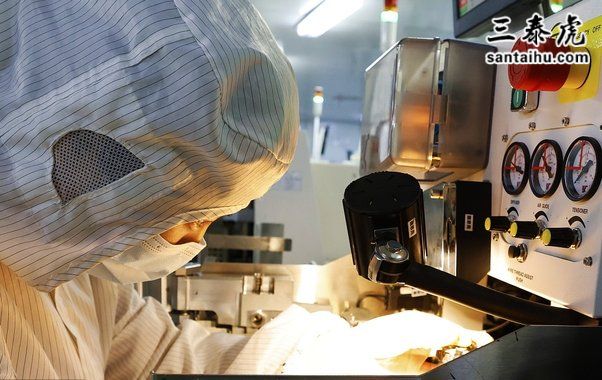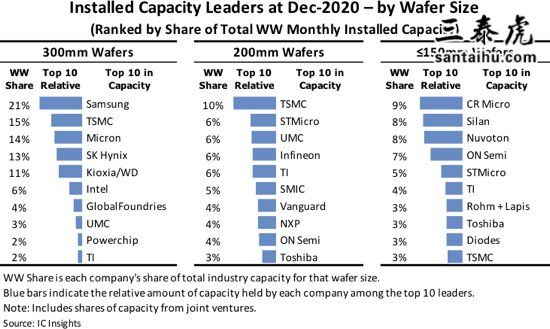Will China eventually become the global leader in chip making?
中国最终会成为全球芯片制造的领导者吗?
以下是Quora网友的评价:
Peter Kaye
It already is, what a lot of people tend to forget is that Taiwan, is Chinese and seeing TSMC is the world leader in Chip making, THAT automatically makes China the number one in the world as far as chips are concerned. TSMC also have two factories on the mainland, so it’s not eventually, for it already is, but on top of that there are many other Chinese companies like Huawei making their own chips as well, so again, China is not becoming the global leader in chip making, they already are.
中国已经是顶流了,很多人总是故意“忘记”台湾地区属于中国这个事实,认为台积电才是全球芯片制造的引领者。
在芯片领域,这个事实让中国荣登世界第一的宝座。台积电在大陆也有两家工厂,所以这不是未来会不会的问题,而是中国已然是世界第一了。
但最重要的是,还有许多其他中国公司,如华为,也在研制自己的芯片,所以,中国不是现在开始逐步变成芯片制造的全球领导者,他们已经是了。
Michael Teo
Potentially, YES. The Chinese are resilient and resourceful, if just the last 45 years is any indication. Sanctions against China on chip supply only make them more determined to become self sufficient and focused to rely on themselves. They will end up develo and producing more advanced chips that will compete against current suppliers. So the sanctions will work against the US in time to come.
就潜力方面,是的。从过去45年的情况来看,中国人非常坚毅、足智多谋。芯片制裁只会让中国人更加坚定地实现自给自足。他们会研发和生产出更先进的芯片,和现有的供应商竞争。所以,芯片制裁未来会对美国产生不利影响。
Understanding China
China has achieved rapid development in the past four decades and will continue its high-quality development in the future. China has the advantage of a mega market, which has a strong attraction to global resource factors. At the same time, China has been committed to cultivating high-tech innovative talents and striving to make up for the shortcomings of the industrial chain, supply chain, value chain and innovation chain. Given time, anything is possible.
过去40年,中国实现了快速发展,今后还将继续实现高质量的发展。中国拥有庞大的市场优势,对全球资源要素具有很强的吸引力。与此同时,中国一直致力于培养高科技创新人才,努力弥补产业链、供应链、价值链和创新链的短板。只要给中国一点时间,一切皆有可能。

As a technology-intensive manufacturing industry, producing chips requires thousands of processes and more than 70 cross-border transactions to complete. The high degree of internationalization of the chip industry has led to a high degree of internationalization of related enterprises.
Some country's attempt to use chip manufacturing to "control China with chips" in order to maintain its hegemony is not only difficult to change the general trend of highly internationalized chip industry, but also unlikely to bring any benefit to the world economy which is on the verge of recession.
作为技术密集型的制造业,生产芯片需要数千道工序和70多笔跨境交易才能完成。芯片产业的高度国际化带动了相关企业的高度国际化。
某些国家企图利用芯片制造“控制中国”,维持自己的霸权地位,但此举不仅难以改变芯片产业高度国际化的大趋势,而且也不太可能给处于衰退边缘的世界经济带来任何好处。
China has taken the initiative to promote the process of industrial openness, and the degree of openness is getting higher and higher. This is a continuous “bigger cake” process, not only will not bring “industrial extrusion” problem, but will be conducive to promoting technical cooperation and technological progress of countries, bringing greater space for global industrial cooperation.
Therefore, whether from the domestic development or international cooperation attitude, China’s potential in the chip manufacturing industry is unlimited.
中国主动推进产业开放进程,开放程度越来越高。这是一个不断“做大蛋糕”的过程,不仅不会带来“产业挤压”问题,反而有利于促进各国技术合作和技术进步,为全球产业合作带来更大空间。
因此,无论从国内发展还是国际合作的态度来看,中国在芯片制造业的潜力都是无限的。
Williemyap Fc
Silicon wafer inserts into the appliances for our everyday conveniences translates into excessive reliance on semiconductors we call chips. From smartphones to the washing machine, each in the technological advances utilize chips for the algorithm input and output.
The US placed all foreseeable restrictions of tech related exports in the attempts to cripple China's rise. A lesson from the Trump Trade War is the vulnerability of industry to supply chain disruption. US awakened China to the fact that without US tech inputs, critical advantages in opportunities are lost.
为了让日常生活越来越便利,我们在电器中植入硅晶圆,导致了我们对半导体的过度依赖,我们将这种硅晶圆称为芯片。从智能手机到洗衣机,每一项技术进步都用芯片进行算法输入和输出。
为了削弱中国的崛起之势,美国对科技相关出口实施禁令。特朗普贸易战的一个教训是,工业容易受到供应链中断的影响。美国让中国意识到,离开美国的科技进口,中国在机遇方面就会失去关键优势。
Intel, Samsung and TSMC are the notable few in cutting edge high tech chip manufacturing. With so few suppliers, any form of incidents can cause disruption as seen with EV plants temporary shutdown.
China is not ready to play hostage to unpredictable circumstances that can reverse the progress, so hard fought for.
英特尔、三星和台积电是少数几家在尖端高科技芯片制造领域非常成功的企业。由于供应商太少,任何意外都可能导致生产中断,就像电动汽车工厂曾暂时关闭那样。
中国还没有准备好在无法预测的情况下充当人质,这种情况可能会逆转来之不易的进步成果。
In the past, multilateral trade convenience did not draw the attention of the education system. Gearing towards STEM graduates annually seems the only way forward with R&D in all related technology. Billions in investments, foreign experts roped in to teach and apply, thus to expediting the chips initiative. China's determination should not be underestimated in spite of the obstacles the US keep adding.
The short term disruptions of Trump's trade war will instead propelled China to a long term winner in self sufficiency.
过去,多边贸易的便利性并没有引起教育系统的注意。在相关技术的研发方面,每年向STEM毕业生进行培训似乎是唯一的出路。数十亿美元的投资,外国专家的教学和应用,从而加快了芯片计划。尽管美国不断增加障碍,但中国的决心不应被低估。
特朗普贸易战的短期破坏反而会推动中国成长为自给自足的长期赢家。
Donald Canton
Yes, China will become the global leader in semiconductor chip manufacturing and beyond.
It has come faster and sooner than you wish.
They will make their goals of Made in China 2025 ahead of time because they have plenty of university graduates for the high tech industries and the biggest and fastest growing domestic market.
是的,中国将成为半导体芯片制造及其他领域的全球领导者。
这会比你希望的来得更快、更早。
他们将提前实现“中国制造2025”的目标,因为中国有大量的大学毕业生从事高科技行业,还有规模最大、增长最快的国内市场。
Kanthaswamy Balasubramaniam
China already leads in manufacture of 45 nm and 28 nm Chips. In fact they manufacture over 90% of the worlds chips in this category. They are the only ones who can make a profit in this area due to massive economies of scale.
China is likely to become the largest leader of 14 nm Chips by 2026 given that China domestically manufactures the EUV Lithiograph to make these Chips. However today China only manufactures for 32% of its demand and imports the rest.
中国已经在制造45纳米和28纳米芯片方面处于领先地位了。事实上,在这个等级的芯片中,中国的产量占到了全球90%以上。由于巨大的规模经济,他们是唯一能在这个领域获利的国家。
到2026年,中国有可能成为14纳米芯片的引领者,因为中国已经实现了制造这些芯片的EUV光刻机的国产化。但如今中国的产量只能满足国内32%的需求,其余部分依靠进口。
However the 7 nm and 5 nm Chips are still a distant dream for China. They dont have Domestic EUVs and depend entirely on Dutch made EUVs and this Technology is restricted by US related pressure.
In the Lab, China has designed both 7 nm and 5 nm but commercially - they are not close to develo an EUV that can make the 7/5 nm chips
However i think by 2035, China will be able to outproduce Taiwan in all Chips. This is because of economics and market demand in China.
When there is a Domestic Demand and people are hungry, there is always development of technology
但7纳米和5纳米芯片对中国来说仍将是一个遥远的梦想。中国没有国产的EUV,完全依赖荷兰机器,而迫于美国的压力这项技术也受到限制。
中国已经在实验室里设计出了7纳米和5纳米级别的芯片,但在商业上还没有研发出可以制造7纳米和5纳米芯片的EUV。
不过我认为到2035年,中国大陆就能在所有芯片的生产上超过台湾地区。这是由于中国的经济和市场需求。
只要存在国内需求,需求得不到满足,就会推动科技的发展。
AKella Murty
Whether leader in Chip making (including embedding ML,AI,Math..Symolic…) or not it will make at the rate of “ Potato” chip making rate. We should note China is heading for 6G . In quantum computing it is making strides. May be by 2030 China stands high in grand masters level. A nation with capabilities, resolve,efforts and competitive spirit can do any thing .
无论能否在芯片制造(包括嵌入机器学习、人工智能、数学、符号等)方面处于领先地位,中国都会以薯片加工的速度完成生产。我们应该注意到,中国已经开始朝着6G发展了。在量子计算方面,中国也完成了大踏步的进展。也许到2030年,中国会达到大师水平。一个有能力、有决心、有努力、有竞争精神的民族,无论什么事情都能做成。
Chiang Seng Erh
China will become self sufficient for chip supply, chip quality, chip’s application and other chip’s advancements. To be global leader or not, it is not a prime concern.
China has no fear to lose leadership status like those American politicians
中国将在芯片供应、芯片质量、芯片应用等方面实现自给自足。能否成为全球领导者,并不是首要考虑的问题。
中国可不像那些美国政客,害怕丢掉领导地位。
Patrick Chong
The way China is going, there’s no reason to doubt that they will be able to make it. Take for example in space. China asked the US to accomodate their astronauts, US told them to buzz off. Today, China send their own space station without US help. On another front, China boast the most connected rail network of bullet train than any early leaders such as Japan, Canada and France. US wouldn’t help China with quantum computers but now they can match with and even surpass the US. What about telecommunication technology? US is a laggard, so is Nokia and Ericcson but China has Huawei and 5G! So, ask yourself, what is there to stop China?
按照中国的发展方向,我们没有理由怀疑他们能够成功。以太空为例。中国请美国接受他们的宇航员,美国断然拒绝。
如今,中国在没有美国帮助的情况下发射了自己的空间站。
另一方面,中国拥有比日本、加拿大和法国等早期高铁巨头们更加纵横连通的高铁网络。
美国不愿在量子计算机方面帮助中国,但现在中国也有能力与美国匹敌,甚至超过美国了。
至于电信技术?美国落后了,诺基亚和爱立信也落后了,但中国有华为和5G!
所以你想想看,还有什么可以阻挡中国呢?
Norest Loloup
There are already quite a few Chinese chip companies leading in the world, such as ZTE (designer), SMIC, Tsinghua, Huawei (HiSilicon), Cambricon, etc. But they are still lagging in terms of manufacturing capacity and R&D in higher end chips. The problem with chip tech is the exponential increase in difficulty with every nanometer. The generations go from 14 nm to 10nm, 7nm, 5nm and 3nm.
Given the situation of sanctions from the US due to the trade war, China has no choice but to catch up in its R&D and production capacity. But SMIC, the most advanced chip maker in China, is currently mass producing 14nm chips and has just started to get into the next generation. TSMC from Taiwai, though, is mass producing 5nm chips, as well as Samsung. Both TSMC and Samsung as well as Intel has announced mass production of 3nm chips in the next year or two.
中国已经有相当多的芯片公司处于世界领先地位,如中兴、中芯国际、清华、华为、寒武纪等。但在高端芯片的制造能力和研发方面,中国仍然落后。芯片技术的难点在于从14nm到10nm, 7nm, 5nm再到3nm,每一纳米的难度都呈指数级增长。
在美国因贸易战而对中国实施制裁的背景下,中国不得不提高自己的研发和生产能力。但中国最先进的芯片制造商中芯国际目前正在大规模生产14纳米芯片,刚刚开始向下一代芯片发起挑战。而台湾地区的台积电和三星已经开始量产5纳米芯片了。台积电和三星以及英特尔都宣布将在未来一两年内量产3纳米芯片。

It takes several years of R&D to upgrade into the next level of chip making. So China has a long way to go to catch up with the leaders. But the chinese has the determination to foil American sanctions, so has invested heavily into the chip sector. Eventually Chinese companies will succeed though it may take a while to get there. How long? Next 5 years? I doubt it. Next 10 years? Hard to say, time will tell.
历经几年的研发努力,才能升级到下一代芯片的制造水平。因此,中国要赶上领先国家还有很长的路要走。但中国决心挫败美国的制裁,因此中国大举投资芯片行业。中国公司最终会成功,但可能需要花费一段时间。需要多久?5年?我很怀疑。10年?很难说,时间终将证明一切。
Alex Pupp
Yes China will eventually become de. facto. leader in chip manufacturing, and design. The astronomic cost of such development in labor and manufacture of chips is a key factor. In the west the cost of manpower to design is astronomical compared to China. As is a manufacturing facility. Why are chips manufactured in the east? COST!!!
是的,中国最终会在芯片制造和设计方面处于领先地位。芯片研发需要的天文数字般的人力投入和制造成本才是关键因素。与中国相比,西方国家芯片设计需要的人力成本是天文数字,制造设施也是如此。为什么芯片要在东方进行生产?因为成本呐!!
 (VIP)印媒:中国将半导体竞争升级到
(VIP)印媒:中国将半导体竞争升级到 (VIP)印媒:对中国的光刻机出口许可
(VIP)印媒:对中国的光刻机出口许可 (VIP)华为遭遇两大变革:芯片技术被
(VIP)华为遭遇两大变革:芯片技术被 (VIP)用数据说令人惊叹的中国半导
(VIP)用数据说令人惊叹的中国半导 如果中国攻破7纳米,在半导体行业获
如果中国攻破7纳米,在半导体行业获 (VIP)5纳米芯片来了,华为突然抛出重
(VIP)5纳米芯片来了,华为突然抛出重 (VIP)麒麟9000S芯片的调查结果终于
(VIP)麒麟9000S芯片的调查结果终于 (VIP)日本陷入芯片困境,曾经坚定支
(VIP)日本陷入芯片困境,曾经坚定支